A Colosseum of Epic Proportions
In the year 180 AD, the mighty Roman General Maximus Decimus Meridius (Russell Crowe) finds himself betrayed by the corrupt, power-hungry Commodus (Joaquin Phoenix), the son of the dying Emperor Marcus Aurelius (Richard Harris). Left for dead and stripped of his rank, Maximus is sold into slavery, only to rise again as a gladiator. Fueled by vengeance and driven by the memories of his murdered family, Maximus battles his way through the arenas of the Roman Empire, culminating in a final showdown with Commodus in the heart of the Colosseum.
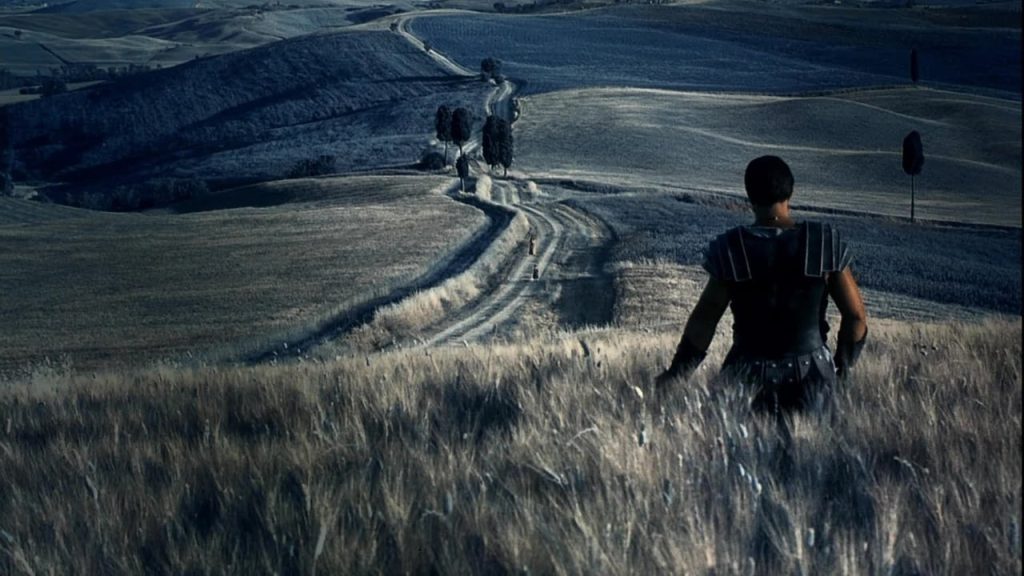
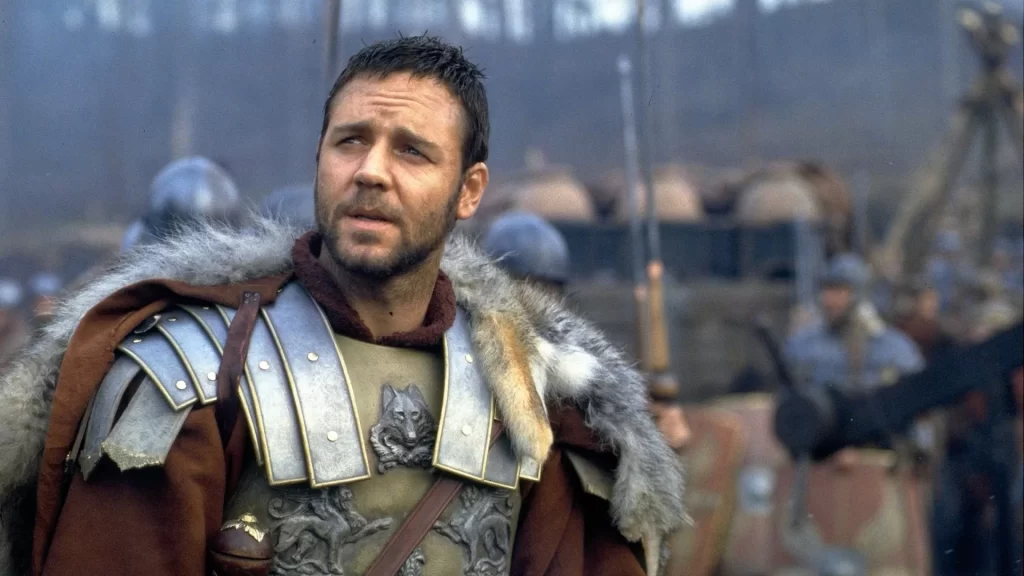
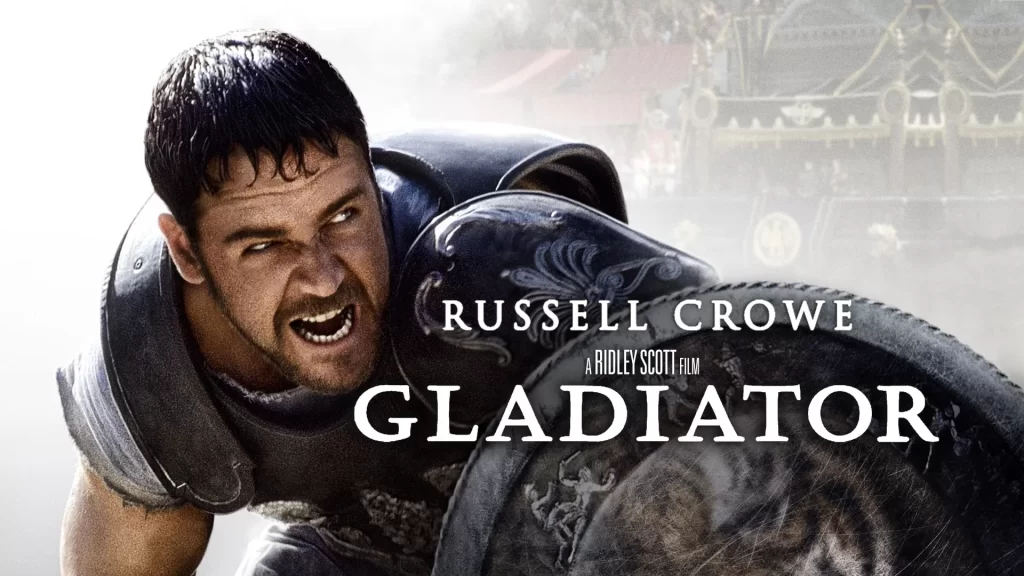
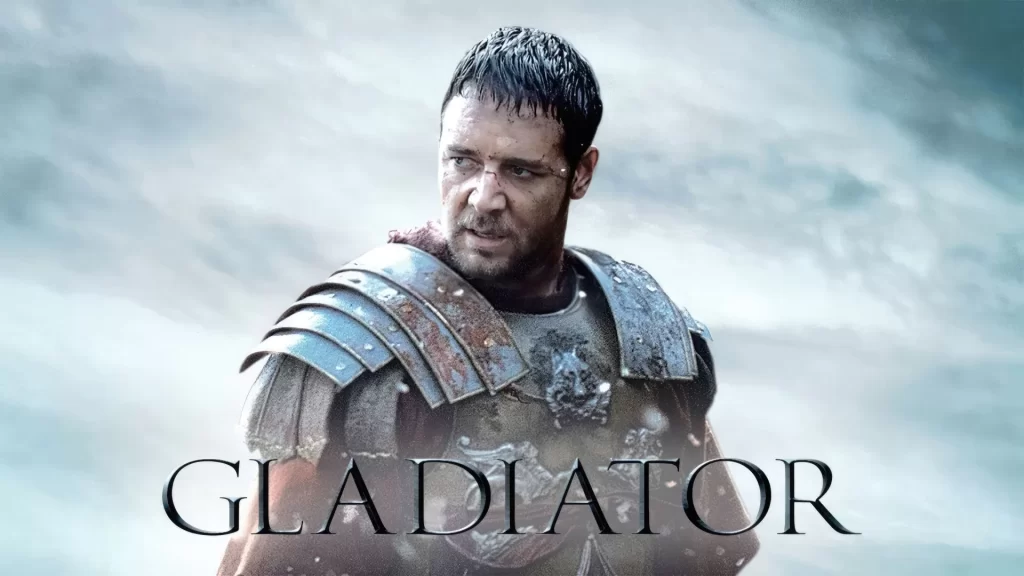
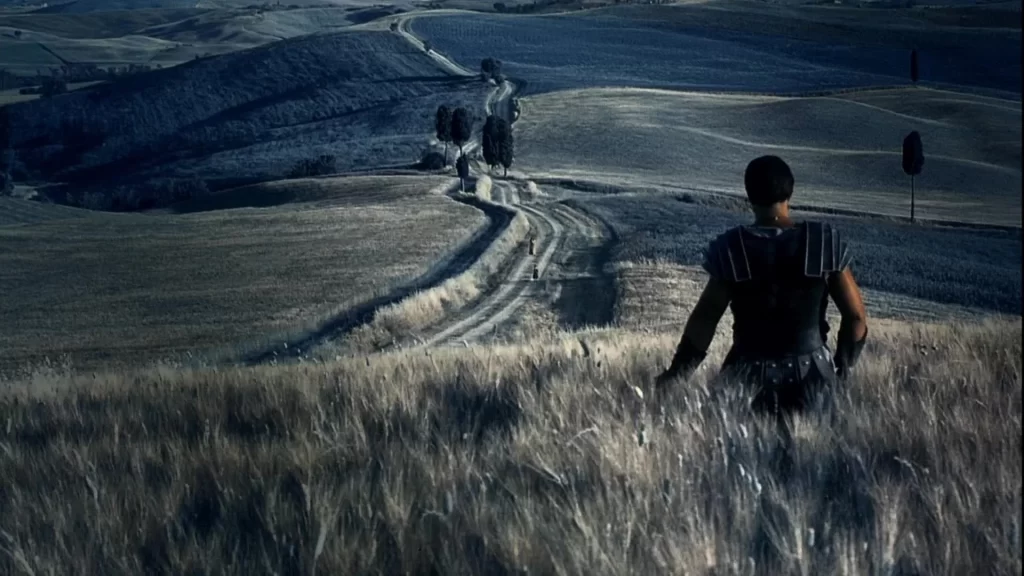
Ridley Scott, a master of visual storytelling, directs “Gladiator” with a keen eye for gritty realism and atmospheric intensity. However, the film’s aesthetic choices, notably its muted color palette and overcast skies, often render the scenes visually indistinct. While this choice aligns with the film’s somber tone, it sometimes obscures the grandeur that one expects from an epic of this scale.
Russell Crowe’s portrayal of Maximus is nothing short of magnetic. His stoic, brooding presence carries the film, and his moments of vulnerability add layers to his character. Joaquin Phoenix excels as the petulant and sinister Commodus, delivering a performance that is both repulsive and pitiable. Connie Nielsen, as Lucilla, brings depth and nuance to her role, while the late Oliver Reed’s Proximo is a standout, combining gruffness with a surprising warmth.
Penned by David Franzoni, John Logan, and William Nicholson, the screenplay of the film is a blend of historical fiction and dramatic flair. The dialogue, while sometimes heavy-handed, often resonates with memorable lines like, “Are you not entertained?” The narrative structure, though predictable, is effective in driving the story forward and maintaining tension.
The film’s visual effects, particularly the CGI-rendered Colosseum, have not aged gracefully. Some scenes feel more like a high-end video game than a historical epic. Yet, Scott’s use of practical effects and set pieces in the gladiatorial combat sequences is commendable, providing a visceral, immersive experience.
Hans Zimmer’s score is a triumph, blending orchestral swells with haunting vocals to create an auditory tapestry that elevates the film’s emotional and epic moments. The music’s recurring motifs serve to underscore Maximus’s journey and the film’s grand scale.
the film explores themes of vengeance, honor, and the corrupting nature of power. Maximus’s quest for justice is juxtaposed with Commodus’s insatiable desire for control, highlighting the moral complexities of leadership and legacy. The film also delves into the notion of spectacle as a means of social control, drawing parallels to modern-day entertainment.
While the film takes significant liberties with historical events and characters, it captures the essence of the Roman Empire’s decadence and brutality. The portrayal of gladiatorial games, though dramatized, offers a glimpse into the spectacle and savagery that characterized Roman entertainment.
Strengths and weaknesses:
The strengths of “Gladiator” lie in its compelling performances, stirring score, and engaging storyline. However, its weaknesses are evident in the murky visual effects and sometimes overly somber tone. Comparisons to classics like “Spartacus” and “Ben-Hur” reveal a film that, while ambitious, lacks the vibrancy and clarity of its predecessors.
Viewer Recommendation:
For those who enjoy a mix of historical drama and intense action, “Gladiator” is a must-watch. Its blend of character-driven storytelling and epic battles makes it standout, despite its visual shortcomings. Stream it now on iWatchOnline.cc for an unforgettable cinematic experience.
Comparisons and context:
“Gladiator” shares thematic and stylistic elements with other historical epics such as “Braveheart” (1995) and “Kingdom of Heaven” (2005), another Ridley Scott film. While “Braveheart” similarly focuses on personal vengeance set against a backdrop of historical upheaval, “Kingdom of Heaven” delves more into the complexities of faith and politics during the Crusades. Compared to these films, it stands out for its focus on the spectacle of gladiatorial combat and the personal vendetta of its protagonist.
Ridley Scott’s directorial style in it can be contrasted with his work in “Blade Runner” (1982) and “Alien” (1979). While “Blade Runner” and “Alien” are defined by their futuristic and claustrophobic atmospheres, the film showcases Scott’s ability to create a sprawling historical epic. The same meticulous attention to detail is evident, though the historical setting of the film required a different approach to world-building and visual storytelling.
Production Background:
The production of “Gladiator” was an ambitious endeavor, marked by both triumphs and challenges. The film was shot across multiple locations, including Malta, Italy, and Morocco, to authentically recreate the Roman Empire’s diverse landscapes. The Colosseum set, a combination of practical sets and CGI, was one of the most expensive and complex ever constructed at the time.
Oliver Reed’s untimely death posed a significant challenge, but the production team used cutting-edge digital effects to complete his remaining scenes, ensuring that his performance as Proximo remained integral to the film. This innovative use of technology set a precedent for future films facing similar challenges.
Memorable Quotes:
“Are you not entertained? Is this not why you are here?” – Maximus
“My name is Maximus Decimus Meridius, commander of the Armies of the North, General of the Felix Legions, and loyal servant to the true emperor, Marcus Aurelius. Father to a murdered son, husband to a murdered wife. And I will have my vengeance, in this life or the next.” – Maximus
“At my signal, unleash hell.” – Maximus
Personal Insights:
“Gladiator” is a film that resonates on multiple levels. Its exploration of personal loss and vengeance is universally relatable, and its depiction of the brutal spectacle of gladiatorial combat is both thrilling and horrifying. However, the film’s darker tones and visual murkiness can sometimes detract from its epic scope. Despite these flaws, the film’s powerful performances and stirring score ensure that it remains a compelling watch.
FAQ:
Is “Gladiator” based on a true story?
While inspired by historical events and figures, “Gladiator” is largely a work of fiction, with many creative liberties taken.
Who composed the music for “Gladiator”?
The score was composed by Hans Zimmer, known for his epic and emotionally resonant compositions.
How did they complete Oliver Reed’s scenes after his death?
The filmmakers used a combination of digital effects and body doubles to complete Reed’s remaining scenes.
Is “Gladiator” suitable for children?
A: Due to its intense violence and mature themes, “Gladiator” is best suited for older teens and adults.
For more details, check out iWatchOnline.cc, the premier platform for streaming your favorite movies and TV shows.
The Legacy of Gladiator: Why It’s Still Worth Watching Online
Two decades after its release, “Gladiator” continues to captivate audiences who watch it online for free. Its enduring popularity can be attributed to several factors that make it a timeless classic in the historical epic genre.
Influence on Modern Cinema
“Gladiator” revitalized the sword-and-sandal epic, paving the way for films like “300” and “Troy”. Its success demonstrated that historical epics could still resonate with modern audiences, influencing both big-screen productions and TV series like “Rome” and “Spartacus”.
Iconic Quotes and Scenes
When you watch Gladiator online for free, you’ll encounter numerous memorable quotes that have become part of pop culture. “Are you not entertained?” and “What we do in life echoes in eternity” are just a few examples of the film’s lasting impact on popular discourse .
Technical Achievements
The film’s use of computer-generated imagery to recreate ancient Rome was groundbreaking for its time. While some effects may look dated to modern eyes when you watch Gladiator online for free, the film’s technical achievements were instrumental in pushing forward the capabilities of visual effects in historical epics .
How to Get the Most Out of Watching Gladiator Online
To fully appreciate “Gladiator” when you watch it online for free, consider the following tips:
- Watch in high definition if possible to appreciate the visual details.
- Use headphones or a good sound system to fully experience Hans Zimmer’s score.
- Consider watching the extended cut for additional scenes and character development.
- After watching, explore behind-the-scenes documentaries to learn about the film’s production.
Comparing Gladiator to Other Historical Epics
When you watch Gladiator online free, you might wonder how it stacks up against other films in the genre. Here’s a brief comparison:
| Film | Year | Comparison to Gladiator |
| Spartacus | 1960 | More politically focused, less action-oriented |
| Braveheart | 1995 | Similar themes of revenge and freedom, different historical setting |
| Troy | 2004 | Larger-scale battles, more mythological elements |
| 300 | 2006 | More stylized visuals, less historical accuracy |
The Impact of Gladiator on Russell Crowe’s Career
Russell Crowe’s portrayal of Maximus in “Gladiator” was a career-defining role. When you watch Gladiator online free, you’re witnessing the performance that catapulted Crowe to international stardom and earned him an Academy Award. This role paved the way for Crowe to become one of Hollywood’s most sought-after leading men in the early 2000s.
Conclusion: The Enduring Appeal of Gladiator
“Gladiator” remains a compelling watch, blending historical drama with action-packed entertainment. Whether you’re a history buff, a fan of epic cinema, or simply looking for an engaging story, the opportunity to watch Gladiator online free is one you shouldn’t miss. Its themes of honor, revenge, and the corruption of power continue to resonate with viewers today, ensuring its place in the pantheon of great historical epics.



